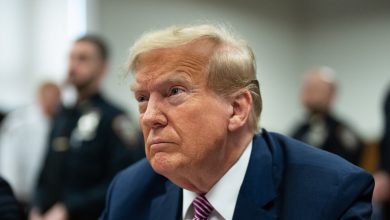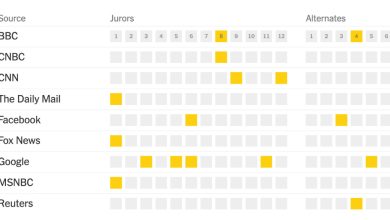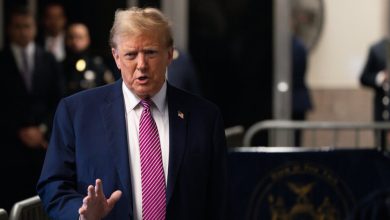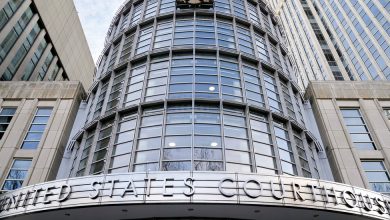Inside U.S. Efforts to Untangle an A.I. Giant’s Ties to China

When the secretive national security adviser of the United Arab Emirates, Sheikh Tahnoon bin Zayed, visited the White House in June, his American counterpart, Jake Sullivan, raised a delicate issue: G42, an artificial intelligence firm controlled by the sheikh that American officials believe is hiding the extent of its work with China.
In public, the company has announced its staggering growth with a steady cadence of news releases. They have included agreements with European pharmaceutical giants like AstraZeneca and a $100 million deal with a Silicon Valley firm to build what the companies boast will be the “world’s largest supercomputer.” Last month, G42 announced a partnership with OpenAI, the creator of ChatGPT.
But in classified American intelligence channels, there have been more concerning reports about the company. The C.I.A. and other American spy agencies have issued warnings about G42’s work with large Chinese companies that U.S. officials consider security threats, including Huawei, the telecommunications giant that is under U.S. sanctions.
U.S. officials fear G42 could be a conduit by which advanced American technology is siphoned to Chinese companies or the government. The intelligence reports have also warned that G42’s dealings with Chinese firms could be a pipeline to get the genetic data of millions of Americans and others into the hands of the Chinese government, according to two officials familiar with the reports.
The C.I.A. even produced a classified profile of Peng Xiao, the chief executive of G42 who was educated in the United States and renounced his American citizenship for an Emirati one, U.S. officials say. The conclusions of the C.I.A. document about Mr. Xiao are unclear.
During the White House meeting in June with Sheikh Tahnoon and in other discussions of the past year, the Biden administration raised concerns about the company’s leadership and pushed for G42 to sever ties with Chinese companies and any agencies, according to a dozen people familiar with the discussions. The Americans have even pointed to the prospect of sanctions against the Emirati firm. The Biden administration’s concerns about G42 and its pressure campaign with the Emirates are being reported here for the first time.
On sensitive emerging technologies, the Emirates must choose between the United States and China, American officials have told their Emirati counterparts.
For years, the United States has been trying to limit China’s influence in the Middle East, and American officials believe Chinese efforts to build military bases and sell weapons in the region are urgent national security concerns. Today, however, there is a new frontier in this effort: blunting China’s ambitions to gain supremacy in the world’s cutting-edge technologies, including artificial intelligence, big data, quantum computing, cloud computing, surveillance infrastructure and genomic research.
G42 is at the center of this fight.
U.S. officials are watching for signs of progress but decline to discuss details of the talks, which have involved the White House and various agencies. They have taken place over months in Washington and in Abu Dhabi, the Emirati capital where both William J. Burns, the C.I.A. director, and Commerce Secretary Gina Raimondo have discussed the matter with the Emiratis during different trips this year. Tarun Chhabra, the National Security Council’s senior director for technology, has also raised concerns with officials in Abu Dhabi.

Commerce Secretary Gina Raimondo raised concerns about G42’s ties to China during a trip to Abu Dhabi in October.Credit…Kevin Dietsch/Getty Images
This article is based on interviews with American government officials, tech analysts and American and foreign business executives, some of whom agreed to speak only on the condition of anonymity because of the sensitive diplomacy over G42.
The company is a crown jewel for the U.A.E., which is building an artificial intelligence industry as an alternative to oil income. The small but powerful Middle Eastern country, led by its president, Sheikh Mohammed bin Zayed, is also cultivating closer ties to China and Russia, in part to lessen its dependence on the United States, the main military partner and arms supplier of the Emirates.
As of now, it is unclear whether U.S. officials have shared their concerns over G42 with American companies that have partnerships with it.
The American efforts to scrutinize and restrict the activities of G42 are emblematic of the murky world in which U.S. spy agencies operate in their broader espionage shadow war with China. As the superpower rivalry intensifies, U.S. policymakers are relying on intelligence collection and analysis to help head off China’s efforts to make technological advances that would erode America’s military edge.
Companies in almost every sector around the globe have ties to China, the world’s second-largest economy. And the U.S. efforts to put G42 under a microscope show how difficult it is for intelligence agencies to discern whether a foreign company with commercial ties to China has links to that country’s military or its security and intelligence agencies.
In some cases, a partnership between a foreign company and a Chinese firm that is considered a favorite of the government or Communist Party — Huawei, for instance — is enough to set off alarms in Washington. Those relations are often opaque when they involve companies working in advanced technologies such as artificial intelligence that have both civilian and military uses.
In the case of G42, the C.I.A. and other government departments have investigated the ties between G42 and Chinese companies and officials. They have flagged some specific areas of concern — pointing out, for instance, that G42’s “stack,” or its underlying technology infrastructure, has been built with the help of Chinese companies, including Huawei. Intelligence agencies have scrutinized a subsidiary of G42 called Presight AI, U.S. officials said. The company sells surveillance technology to police forces worldwide, including software nearly identical to products popular with Chinese police.
Kathleen Waters, a deputy spokeswoman for the National Security Council, declined to address specific issues with G42. She called the Emirates an “important partner” but said White House officials have made clear to the Emiratis and others the administration’s “strong concerns about the P.R.C. seeking military and intelligence advantages through the acquisition of sensitive U.S. technologies and data, which the Biden administration is determined to protect.” (The P.R.C. is the People’s Republic of China.)
Yousef Al Otaiba, the Emirati ambassador in Washington, declined to comment.
G42 declined a request for an interview with Mr. Xiao, its chief executive, and did not answer questions about its partnerships with specific Chinese companies or about U.S. government concerns over those. In a statement to The New York Times, Talal Al Kaissi, a senior executive at the company, said the firm had worked “with various international technology players from around the world.” He noted that it began discussions with Microsoft late last year to try to replace its technology stack or infrastructure. This year, he said, it decided to look to U.S. companies, including Cerebras and Nvidia, to upgrade a supercomputer and shift from its “legacy technology supplier, which included Chinese hardware.”
The company ensures operations and licensed technologies “remain in full compliance” with U.S. government regulations and talks to U.S. agencies about staying aligned with those, he said. It is “partnering with leading companies and institutions with shared values and developing responsible A.I. solutions,” he added.
‘The Ultimate Question of Life’
G42’s name is drawn from “The Hitchhiker’s Guide to the Galaxy,” the science-fiction series by Douglas Adams, in which the number 42 represents the answer to “the ultimate question of life, the universe and everything.” (The G stands for group.)
“Forty-two is really our mission,” Mr. Xiao said in a promotional video for the company last year. “In that amazing book, 42 was the answer to the meaning of life.”
Within that wide remit, G42 encompasses a $10 billion technology investment fund, an Arabic language A.I. model, a tech talent platform, a health care company, a genome-sequencing program and more. G42’s investments overseas include a $100 million purchase early this year of shares in ByteDance, the Chinese company that is the parent of TikTok, the popular social media app, according to a Bloomberg News report.
In a promotional video, Mr. Xiao said he believed that the impact of artificial intelligence on human civilization would be “much more profound than fire, electricity or even internet.”
In addition to collaborations with Chinese companies, G42 has also signed agreements with American companies including Microsoft and Dell Technologies.
Mr. Xiao has impressed some of his American partners.
“He’s a visionary,” said Andrew Feldman, the chief executive of Cerebras, the Silicon Valley A.I. firm that is partnering with G42 on the supercomputer project. “He’s knowledgeable and thoughtful. I found somebody with a shared vision,”
Besides its work with G42, Cerebras has several U.S. government contracts, including with the Air Force Research Laboratory and the Department of Energy, according to public records and Mr. Feldman.
Mr. Feldman said he was surprised to hear about the Biden administration’s concerns about G42 and said that no American officials have raised those concerns with him or other officers at Cerebras.
OpenAI and Microsoft declined to comment, and Dell said, “We comply with global regulations and have nothing additional to add.”
Social Media and Genetic Data
Sheikh Tahnoon, the company’s sunglasses-obsessed chairman, is one of the Emirates’ most powerful men. Even in a state where senior officials often hold multiple posts, Sheikh Tahnoon, a brother of the Emirati president, stands out. In addition to overseeing a secretive conglomerate called the “International Holding Company” — the country’s most valuable listed firm — Sheikh Tahnoon is also the deputy ruler of the emirate of Abu Dhabi and head of an $853 billion sovereign wealth fund. (Another family-run sovereign wealth fund, Mubadala, has a stake in G42.)
Mr. Xiao has been a part of Sheikh Tahnoon’s ventures for some time, and several of the past partnerships have set off alarms within American spy agencies.
There is very little about Mr. Xiao’s background online, which is rare for a chief executive of a prominent company. His LinkedIn page and corporate profiles say he earned bachelor’s degrees at Hawaii Pacific University and a master’s degree at George Washington University in the 1990s, but there is no information on his years before college.
His LinkedIn account says he worked from 1999 to 2014 as a chief technology officer for MicroStrategy, a technology company in Virginia. He has rarely given individual interviews to journalists but has done some public talks. An online post by China’s embassy in the Emirates that mentions him uses the Chinese name 肖鹏.
Four years ago, a firm led by Mr. Xiao had a hand in the operation of a social media app, ToTok, that American intelligence agencies identified as a spy tool that the Emirati government was using to track the movements and conversations of its users. Chinese engineers helped create the app.
The data harvested from the app, according to a 2019 American intelligence assessment, was stored by an Emirati firm called Pax AI, which Mr. Xiao ran.
Bill Marczak of Citizen Lab, a digital watchdog group at the University of Toronto, has researched the constellation of companies controlled by Sheikh Tahnoon, and called them “master classes in blending state power and business.”
“Because ToTok worked so well, its popularity took off among Emiratis and their contacts abroad,” Mr. Marczak said. “And since the app’s encryption didn’t prevent Group 42 from accessing ToTok users’ conversations, the app could have fed a huge volume of juicy data back to U.A.E. intelligence.”
Mr. Marczak said that G42 “seems to have absorbed assets and personnel from Chinese chat app YeeCall in order to create ToTok.” After a New York Times investigation into ToTok in 2019, company representatives denied that it had been built to be a spy tool.
At the start of the coronavirus pandemic in 2020, G42 partnered with a Chinese biotech firm, BGI Genomics, to distribute its Covid-19 tests, and the Emirati government donated tens of thousands of the tests to the State of Nevada. American officials warned Nevada officials not to distribute the tests out of concern that the operation could be a secret ploy by the Chinese government to gather genetic information about Americans from the tests, The Associated Press reported.
In March, the Biden administration put subsidiaries of BGI on a Commerce Department blacklist and said that collection and analysis of genetic data done by the companies “poses a significant risk of contributing to monitoring and surveillance by the government of China.”
In June 2020, Mr. Xiao and Emirati leaders announced that G42 was partnering with Sinopharm, the Chinese drug giant, to do Phase 3 of clinical trials for a Covid-19 vaccine. That trial expanded to other nations in the region, including Bahrain, whose crown prince spoke by video with Mr. Peng and the chairman of Sinopharm, according to an online post by China’s embassy in Bahrain.
In March 2021, Wang Yi, China’s foreign minister, announced on a visit to the Emirates that G42 and Sinopharm would produce the vaccine in Abu Dhabi.
One of Mr. Xiao’s previous ventures, Pegasus, signed an agreement in 2017 with Huawei to develop surveillance technologies for police forces. That company was owned by DarkMatter, a cyber-intelligence and hacking firm that employs former spies. It had no relation to the notorious spyware also called Pegasus that was developed by NSO Group, an Israeli firm.
Charging Into the Middle East
The Chinese government has made no secret of its intentions to expand the country’s economic and military footprint in the Middle East. The deepening ties between China and the U.A.E. have been a cause for particular alarm for American officials.
The Emirates regularly purchases billions of dollars worth of American military equipment, but the country has also shown eagerness to buy Chinese military hardware.
The Trump administration cultivated close ties to Emirati leaders, but national security officials were wary of the U.A.E.’s growing ties to China. Several officials disliked the fact that Huawei was providing main elements of the country’s technology infrastructure. That issue became more contentious after the United States agreed in 2020 to sell advanced F-35 fighter jets to the Emirates as an incentive to get the country to normalize ties with Israel.
American officials try to ensure technology around those jets does not fall into the hands of adversaries. Around this time, U.S. agencies began looking more closely at Mr. Xiao and G42 because of its prominent role in technology in the Emirates. G42 opened an office in Israel after normalization. (The F-35 deal ultimately did not go through.)
Early in the Biden administration, American officials confronted Emirati officials with satellite images that they argued showed China was building a military base in the country. Since then, U.S. officials say, the Emirates has suspended the project. Emirati officials insist it was commercial port construction.
Still, C.I.A. officials have made regular trips to Abu Dhabi to present classified information to the Emirates that buttresses the Americans’ concerns about security and technology ties between China and the U.A.E.
In June, just days after White House officials privately raised concerns about G42 to the Emirati national security chief, Mr. Xiao took the stage for a companywide town hall for G42’s fifth anniversary.
At the event, which the company called “Supercharged,” Mr. Xiao said the company was just getting started.
Vivian Nereim contributed reporting from Riyadh, Saudi Arabia, Paul Mozur from Dubai, United Arab Emirates, and Taipei, Taiwan, and Amy Chang Chien from Taipei.




